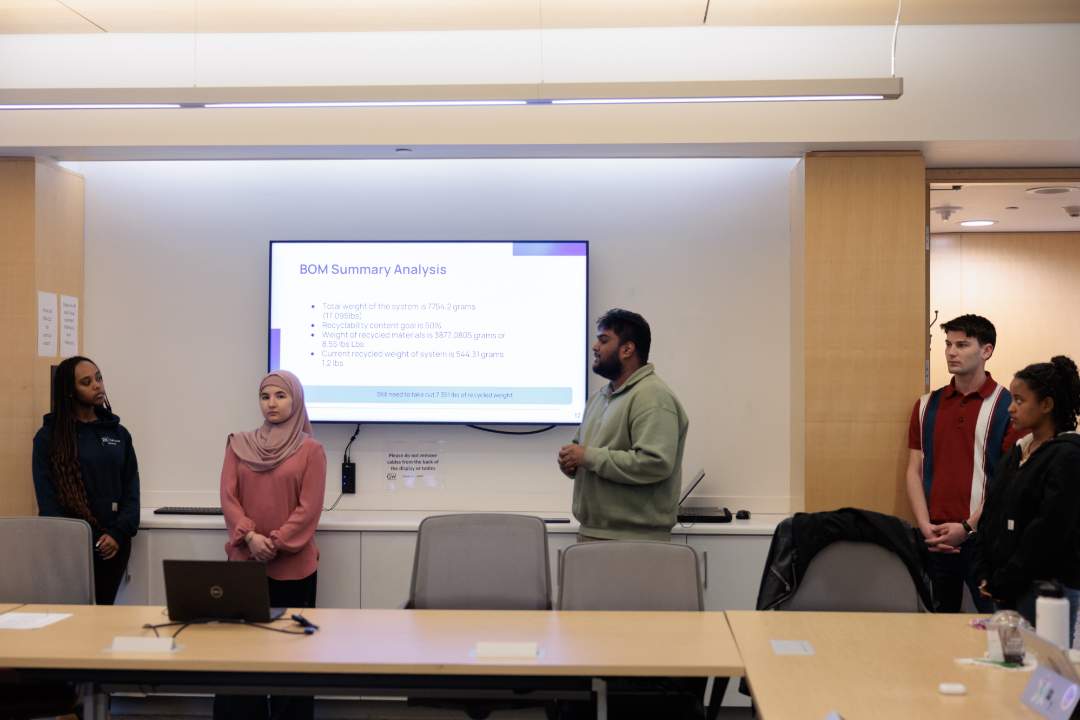What problem does this project tackle?
This project aims to optimize Dell’s material selection process by balancing greenhouse gas (GHG) emissions, cost, weight, and recyclability to support their 50% recycled content goal. It integrates GHG emissions modeling, cost analysis, and weight assessments into a System Modeling (SysML) framework to evaluate trade-offs. A GHG model quantifies ΔCO₂e emissions, capturing the impact of increased recycled content on mining, refining, and disposal emissions. A cost model ensures feasibility, while a weight analysis maintains product constraints. Additionally, an AHP survey gathers stakeholder input to prioritize these factors. The final deliverable is a decision-support tool that helps Dell make data-driven sustainability choices.
Who experiences this problem in the world?
The problem is experienced by electronics manufacturers, policymakers, and consumers worldwide, as a lot of companies face increasing pressure to reduce carbon footprints and meet sustainability goals while maintaining cost efficiency and product performance. Governments and regulatory bodies enforce stricter environmental policies, requiring manufacturers to track and reduce Scope 3 emissions. Consumers are also demanding eco-friendly products, pushing companies like Dell to optimize material sourcing, recyclability, and emissions reduction. Additionally, supply chain disruptions and resource scarcity make it crucial for businesses to find sustainable and cost-effective alternatives for raw materials.
Why is this problem important?
The problem is important because electronics manufacturing significantly contributes to global greenhouse gas emissions and waste generation. As companies like Dell work toward sustainability goals, optimizing recycled material use, reducing emissions, and balancing costs is critical to minimizing environmental impact. Addressing this issue helps reduce reliance on virgin materials, lower Scope 3 emissions, and support a circular economy, where materials are continuously reused instead of discarded. Additionally, with regulatory pressures, consumer demand for sustainable products, and corporate responsibility commitments, solving this problem ensures long-term business viability and environmental sustainability.
What specific technical problems did you encounter:
One of the main technical challenges in this project is accurately modeling the emissions impact of increased recycled content while ensuring alignment with Dell’s methodology and industry standards. Reconciling our approach with Dell’s top-down PCF approach requires careful analysis. Additionally, integrating emissions, cost, and weight data into the SysML framework while maintaining scalability and accuracy presents modeling challenges.
Describe the coolest thing about your project:
The coolest thing about this project is its data-driven approach to sustainability, combining GHG emissions modeling, cost analysis, and recyclability assessments into a comprehensive decision-support tool. Instead of relying on sustainability estimates, the project quantifies the real impact of using recycled materials, helping Dell make informed trade-offs between emissions, cost, and product performance. The integration of SysML modeling and scenario analysis is an interesting and valuable experience we are getting for our future career.
Describe any sustainable design considerations driving your solution:
Sustainable design considerations are at the core of this project, driving the development of a data-driven framework for optimizing recycled material use in Dell’s products. The project focuses on reducing Scope 3 emissions by analyzing how increasing recycled content affects GHG emissions, cost, and producibility. By incorporating industry data, life-cycle assessment principles, and circular economy strategies, the project supports Dell’s long-term sustainability goals while maintaining cost efficiency and product integrity.
Project Name: Green Tech Revolution: Transforming Dell’s Production Lifecycle
Team Members: Jake Anszelowicz, Kidist Bekele, Arsema Demeke, Lola Nurullaeva, Vijay Jayamani
Team Mentors: N/a
Team Sponsors: Dell Technologies


